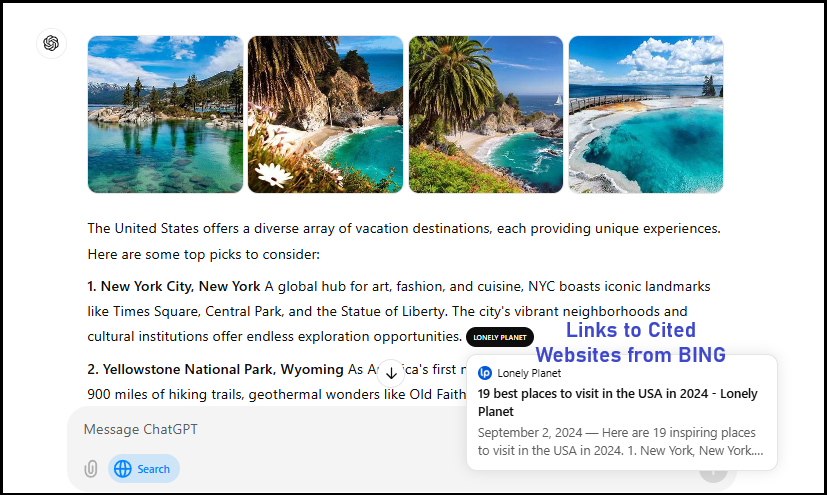Why Rank Higher In Bing?
Bing is integrated into ChatGPT’s search functionality to retrieve real-time information from the web. When a user asks for up-to-date content, such as news, live events, or specific information not contained in the model’s training data, the browser-enabled version of ChatGPT uses Bing to search the web and pull relevant results.
This integration allows ChatGPT to access the latest data beyond its knowledge cutoff date, providing users with more accurate and current responses. This capability enhances the model’s performance, especially for queries requiring up-to-the-minute details, ensuring that ChatGPT remains a helpful resource for both general knowledge and real-time information needs.
Getting SEO backlinks for Bing crawlers involves understanding how Bing’s algorithm works differently from Google’s and optimizing your website’s backlink strategy accordingly. While both search engines value high-quality backlinks, Bing tends to give more weight to certain aspects that may differ from Google’s criteria.

Here are strategies to improve your backlinks for Bing and enhance your site’s performance on its SERPs:
1. Focus on Relevant and Authoritative Backlinks
Bing values authoritative and niche-specific backlinks, so:
- Target industry-specific directories and websites for backlinks. Unlike Google, Bing still places significant weight on relevant directories and quality local listings.
- Get featured in high-authority blogs and industry sites that are relevant to your niche. Guest posting, partnerships, and influencer marketing work well for this.
- Use trusted sources for backlinks, such as educational (.edu) and government (.gov) websites, which are still considered valuable by Bing.
2. Increase Social Media and Social Bookmarking Links
Bing places a heavier emphasis on social signals compared to Google:
- Leverage social media: Build your presence on platforms like Facebook, Twitter, LinkedIn, and Instagram. Share content and get backlinks from social shares, comments, and profiles.
- Engage in social bookmarking: Websites like Reddit, Digg, StumbleUpon, and others can provide backlinks that are helpful for Bing’s crawlers.
3. Ensure Quality Content That Attracts Backlinks
Both Bing and Google reward websites with quality, authoritative content:
- Create in-depth, well-researched, and valuable content that naturally attracts backlinks. This content should answer users’ questions, provide solutions, and serve a specific need.
- Infographics, case studies, and research can help generate backlinks, as other websites are more likely to cite them.
- Content repurposing: Turn long-form articles into shorter blog posts, videos, or infographics, which can increase sharing opportunities and backlinks.
4. Use Bing Webmaster Tools to Track Backlinks
While Google’s Search Console is the go-to tool for backlink analysis, Bing also offers a similar service:
- Bing Webmaster Tools allows you to monitor backlinks pointing to your site. This can help you identify opportunities for link-building and track your backlink profile over time.
5. Local Citations and Backlinks
Bing tends to have a stronger emphasis on local search results:
- Get listed in local business directories and citation websites (e.g., Yelp, Yellow Pages, and local chambers of commerce).
- Build location-specific backlinks by engaging with local influencers, news outlets, and events.
6. Use Natural Anchor Text and Avoid Over-Optimization
Bing’s algorithm tends to prefer natural anchor text and penalizes excessive keyword optimization in backlinks:
- Ensure that your backlinks use a variety of anchor text rather than just a keyword-heavy approach.
- Contextual relevance is essential. Your backlinks should appear naturally within relevant and well-written content, avoiding “spammy” tactics like excessive link exchanges or link farms.
7. Focus on Diverse Backlink Types
Bing places value on a variety of backlink types. To diversify your backlink profile:
- Dofollow and nofollow links: Both links are important for Bing, so don’t focus solely on dofollow links. Nofollow links can still drive traffic and help with indexing.
- Text, image, and video links: To improve backlink diversity, incorporate a variety of content types that link to your site, including images, videos, and other media.
- Forum and community links: Engaging in discussions on niche forums and communities can provide valuable backlinks.
8. Use Bing-Friendly SEO Techniques
While backlinks are important, other on-page SEO factors also matter to Bing’s algorithm:
- Optimize your content for Bing’s ranking factors, including page load speed, mobile-friendliness, and straightforward site navigation.
- Use structured data markup (Schema.org) to help Bing better understand your content, which can indirectly improve backlink effectiveness.
9. Monitor Competitors’ Backlinks
Analyze the backlink profiles of your competitors, particularly those that perform well on Bing’s search results:
- Use tools like Ahrefs or SEMrush to discover which backlinks are driving traffic to your competitors.
- Replicate successful strategies: Identify websites that link to your competitors but not you and contact them for link opportunities.
10. Quality Over Quantity
Bing is more likely to prioritize backlinks from high-quality, reputable sources. Don’t focus on building numerous low-quality links, which can hurt your rankings:
- Instead, aim for fewer high-quality backlinks from authoritative sites in your niche.
Key Differences in Bing’s Backlink Preferences:
- More emphasis on local signals: Local businesses should focus on local backlinks and citations, as Bing ranks them highly.
- Social signals matter more: While Google focuses heavily on backlinks, Bing gives more weight to social media signals and social shares.
- Page freshness: Bing might favour newer, fresher content, so update existing content and regularly add new, relevant content.
Implementing these strategies will improve the optimization of your website’s backlinks for Bing crawlers, ultimately improving your rankings on Bing’s SERPs.
